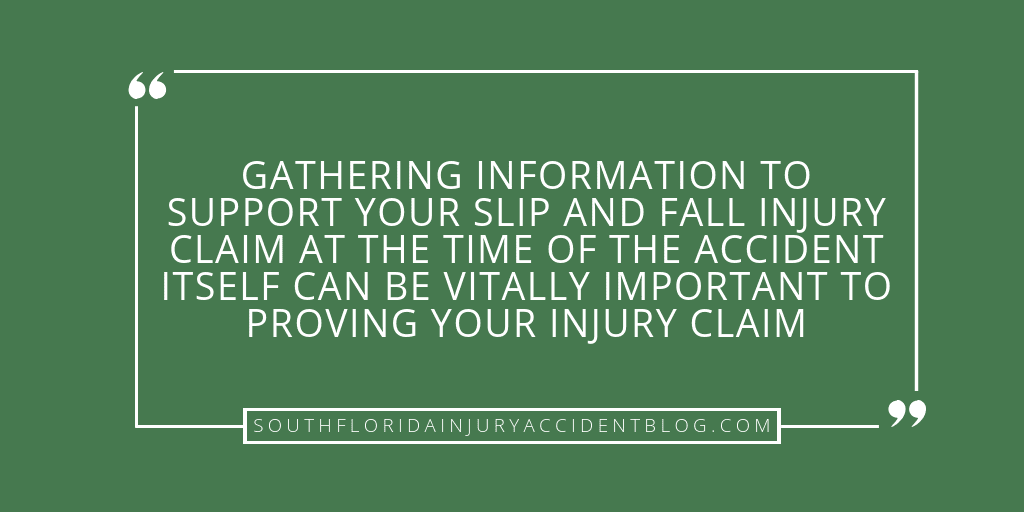Updated: 2/9/23
In our last post, we discussed the steps you need to take after a slip and fall accident no matter where it happens. In Florida, for example, fall injuries happen all the time in fun places like restaurants, bars and grilles, hotels, and entertainment parks, as well as grocery stores, condo pools, and parking lots.
Gathering information to support your slip and fall injury claim at the time of the accident itself can be vitally important to proving your injury claim. However, once you have that raw data, other steps must be taken to insure that the information is given legal respect as concrete proof and formal evidence of your injuries and the damages you have suffered as a result.
To do this, Florida law establishes specific requirements for the type of proof needed to file a claim at each of these locations.
Florida Statute 768.0755 states:
(1) If a person slips and falls on a transitory foreign substance in a business establishment, the injured person must prove that the business establishment had actual or constructive knowledge of the dangerous condition and should have taken action to remedy it. Constructive knowledge may be proven by circumstantial evidence showing that:
(a) The dangerous condition existed for such a length of time that, in the exercise of ordinary care, the business establishment should have known of the condition; or
(b) The condition occurred with regularity and was therefore foreseeable.
(2) This section does not affect any common-law duty of care owed by a person or entity in possession or control of a business premises.
What is important here is to recognize that Florida law requires the injury victim to prove that the premises owner was to blame for what happened, I.e., was “negligent.”
You have to prove with authenticated, admissible evidence that:
- the accident happened through evidence like witness statements and photos from the scene,
- you have to show that you were injured through things like medical bills and doctors’ statements, and
- you have to prove that the premises owner was knowledgeable and didn’t respond (“was negligent”) at the time of your accident.
What Circumstantial Evidence Must the Plaintiff Provide to Prevail?
Circumstantial evidence can be very critical in a slip and fall injury case. Since the statute requires the injury victim to prove the owner’s actual or constructive knowledge of the “dangerous condition” and the need to take “action to remedy it,” you need to have proof to support your claim of this knowledge from someone who’s your opponent here, who is denying liability.
Circumstantial evidence important in a Florida slip and fall case to establish the premise owner’s knowledge can include:
1. Weather reports that confirm a heavy rain on the day of the accident, showing that the owner should have known about the slippery conditions causing the fall. See, Doudeau v. Target Corporation.
2. Store surveillance camera footage of the parking lot and steps taken by the premises owner after it rained. See, Walker v. Winn-Dixie, Inc.
3. Past incident reports at the store for similar slip and fall injuries to the one suffered by the plaintiff when she slipped and fell on spinach that had fallen onto the grocery store aisle. See, Publix v. Santos.
Often, it’s necessary to have an experienced personal injury lawyer at your side when you are trying to build evidence of the premises’ owner’s actual or constructive knowledge of the dangerous condition and their failure to take action to fix it.
Proof of damages and proof of the accident itself may be evidence that is easy enough to locate and document; however, gathering legal evidence of the knowledge of the owner may require formal discovery through an official lawsuit if the owner is denying responsibility.
What Should You Do Now?
A good piece of advice if you have been harmed by a slip and fall, is to at least speak with an experienced personal injury lawyer before you file a claim to learn about some of the issues that can arise with these claims, including the type of evidence needed to prove a claim and the type and amount of damages you can recover. Most personal injury lawyers, like Alan Sackrin, will offer a free initial consultation (over the phone or in person) to answer your questions.
Related:
_______________
 Do you have questions or comments? Then please feel free to send Alan an email or call him now at (954) 458-8655.
Do you have questions or comments? Then please feel free to send Alan an email or call him now at (954) 458-8655.

